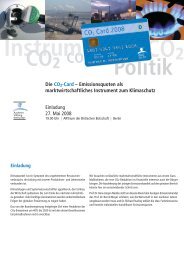Impulses for Growth and Employment through Profitable Savings in ...
Impulses for Growth and Employment through Profitable Savings in ...
Impulses for Growth and Employment through Profitable Savings in ...
Create successful ePaper yourself
Turn your PDF publications into a flip-book with our unique Google optimized e-Paper software.
celerate the spread of best practice with<br />
special support programmes. Moreover,<br />
via its own procurement <strong>and</strong> by improv<strong>in</strong>g<br />
consumer <strong>in</strong><strong>for</strong>mation with regard to life<br />
cycle cost it can enhance market access<br />
<strong>and</strong> the spread of profitable dematerialised<br />
goods <strong>and</strong> services. And the government<br />
can make sure that every university<br />
graduate is <strong>in</strong> comm<strong>and</strong> of the ABC of<br />
dematerialization <strong>in</strong> his or her profession.<br />
The Question at Issue<br />
If economic policy is to commit itself to<br />
support<strong>in</strong>g profitable dematerialization<br />
then a pre-quantification of atta<strong>in</strong>able economic<br />
results is expedient. To this end the<br />
Aachen Foundation Kathy Beys – whose<br />
focus of work is dematerialization – has<br />
commissioned a study whose results are<br />
presented <strong>in</strong> this paper.<br />
The question at issue of this study is:<br />
What effects upon private sector turnover,<br />
employment <strong>and</strong> public budgets arise if<br />
the observable s<strong>in</strong>gle-company efficiency<br />
reserves of profitable dematerialization are<br />
widely implemented <strong>in</strong> the national economy?<br />
Scientific appraisals of the macroeconomic<br />
effects of profitable dematerialization are<br />
not yet available <strong>in</strong> Germany as far as the<br />
authors are aware.<br />
With regard to the similar processes of<br />
s<strong>in</strong>gle-company cost-neutral dematerialization<br />
as well as profitable reduction of<br />
cost factors other than material <strong>through</strong>put<br />
selected exist<strong>in</strong>g appraisals are summarised<br />
below.<br />
Appraisals of S<strong>in</strong>gle-Company Cost-<br />
Neutral Dematerialization<br />
In a study commissioned by Greenpeace,<br />
the Prognos AG 5 exam<strong>in</strong>ed the effects on<br />
employment <strong>and</strong> growth of a s<strong>in</strong>glecompany<br />
cost-neutral dematerialization<br />
<strong>through</strong> a shift of goods <strong>and</strong> services from<br />
material-<strong>in</strong>tensive to less material<strong>in</strong>tensive<br />
<strong>for</strong>ms of production or sectors.<br />
5 Prognos AG, Mehr Arbeitsplätze durch ökologisches<br />
Wirtschaften? E<strong>in</strong>e Untersuchung für<br />
Deutschl<strong>and</strong>, die Schweiz und Österreich, Gutachten<br />
im Auftrag von Greenpeace, Hamburg 1999.<br />
For <strong>in</strong>stance, a shift of agricultural production<br />
from conventional to biological farm<strong>in</strong>g<br />
<strong>and</strong> a shift of transport from private to public<br />
transport was modelled. The effects <strong>for</strong><br />
the year 2020 <strong>in</strong> Germany, Switzerl<strong>and</strong><br />
<strong>and</strong> Austria were assessed us<strong>in</strong>g a comb<strong>in</strong>ed<br />
bottom-up <strong>and</strong> <strong>in</strong>put-output model.<br />
In sum, a reduction of material <strong>in</strong>put by<br />
25% as well as of non-renewable energy<br />
sources by 30% <strong>in</strong> 2020 aga<strong>in</strong>st the basel<strong>in</strong>e<br />
of 1990 led to slightly positive employment<br />
effects <strong>in</strong> all three national<br />
economies studied. For Germany the net<br />
employment effect was over 160,000 new<br />
jobs. Modell<strong>in</strong>g came up with a neutral<br />
effect on the gross domestic product<br />
(GDP) of all three countries.<br />
Meyer <strong>and</strong> Lutz 6 analysed the effects of<br />
the <strong>in</strong>creased <strong>in</strong>put quota observable between<br />
1980 <strong>and</strong> 1990 <strong>in</strong> so-called “other<br />
market-determ<strong>in</strong>ed services”, a heterogeneous<br />
group <strong>in</strong> which, amongst others,<br />
consultancy companies, eng<strong>in</strong>eer<strong>in</strong>g companies,<br />
advertis<strong>in</strong>g agencies <strong>and</strong> clean<strong>in</strong>g<br />
companies are merged. The effects are<br />
determ<strong>in</strong>ed by a comparison of actual developments<br />
with simulated scenarios <strong>in</strong> a<br />
complex econometric Pantha Rhei model<br />
that consists of about 50,000 equations, is<br />
deeply disaggregated by sector <strong>and</strong><br />
whose parameters have been estimated<br />
econometrically on the basis of developments<br />
between 1978 <strong>and</strong> 1994. One of<br />
these scenarios describes de facto the<br />
<strong>in</strong>crease of material <strong>in</strong>put by 10% with a<br />
concomitant identical <strong>in</strong>put reduction value<br />
<strong>in</strong> “other market-determ<strong>in</strong>ed services”.<br />
This cost-neutral deterioration of material<br />
efficiency reduces GDP <strong>in</strong> the 1980-1990<br />
time span by 2.3% <strong>and</strong> the wage bill by<br />
2.4% with a slight <strong>in</strong>crease <strong>in</strong> employment<br />
growth (0.2%).<br />
These results suggest s<strong>in</strong>gle-company<br />
cost-neutral dematerialization can achieve<br />
clearly positive effects upon GDP <strong>and</strong> the<br />
wage bill while only slightly positive or<br />
negative employment effects. Similar re-<br />
6 Meyer, B. <strong>and</strong> C. Lutz, Ökoeffiziente Dienstleistungen<br />
und Materialverbrauch. E<strong>in</strong>e Simulationsstudie<br />
mit dem disaggregierten Modell PHANTA RHEI,<br />
<strong>in</strong> H<strong>in</strong>terhuber, F. <strong>and</strong> H. Schnabl (eds.), Arbeit –<br />
Umwelt – Wachstum. Nachhaltigkeitsaspekte des<br />
sektoralen Strukturw<strong>and</strong>els, Norderstedt 2002, pp.<br />
190-228.<br />
3




